Event Marketing Statistics 2024 By Reasons For Attending The Event, Metrics Of Tracking And Types Of Events

Page Contents
- Introduction
- Editor’s Choice
- General Event Marketing Statistics
- About Event Marketing
- Facts About Event Marketing
- By Reasons For Attending The Event
- By Software
- By Metrics Of Tracking
- By Types Of Events
- By Event Tickets By Region
- By Country
- By Planned Changes In Spending
- By Impact Of Social Media
- Recent Development
- Conclusion
Introduction
Event Marketing Statistics: In the world of cutthroat competition of brands and companies offering similar products and services, promoting brand awareness is important. Event marketing is one of the easiest ways to do so. Expos or conferences provide a better understanding of a brand to prospective consumers. Since COVID-19, the definition of such events changed to virtual marketing events.
Compared to in-person events, virtual events have some limitations to some extent. In-person events offer post-sessions where customers can buy the products directly. Considering the current era, Event Marketing Statistics 2024 provides important updates on informative insights.
Editor’s Choice
- Face-to-face interaction is the best way to close a business deal as stated by 89% of professionals.
- The effectiveness of the event is measured by the number of attendees as stated by 64% of companies.
- 85% of companies experienced a major increase in sales after conducting live event marketing campaigns.
- 47% of marketing professionals said in-person event marketing gives the highest return on investment (ROI).
- Event Marketing Statistics state the primary reason for attending such events consumers is networking representing 81.7%, followed by learning (71.3%) and entertainment (38%).
- 52% of B2B leaders stated they attend such events to learn about newly launched products or services.
- The global event industry is estimated to reach $2.3 billion growing at a CAGR of 10.3% by 2026.
- According to 93% of event attendees, in-person events are the primary decision factor for buying decisions.
- 87% of live event attendees are more likely to buy products or services after completion of the particular event.
- Around the world, 41.5% of marketing professionals are ready to pay $5,000 for new virtual event technology.
General Event Marketing Statistics
- 47% of marketing professionals said in-person event marketing gives the highest return on investment (ROI).
- Furthermore, 97% of media professionals agree that in-person events are crucial for company business.
- Face-to-face interaction is the best way to close a business deal as stated by 89% of professionals.
- Event Marketing Statistics show that around 40 million Americans go to business events every year.
- Around the world, 41.5% of marketing professionals are ready to pay $5,000 for new virtual event technology.
- 31% of marketing professionals say that event marketing is the most effective way to attract more markets.
- 55% of event marketers stated safety as the most common issue while conducting live in-person events.
- Every year, approximately 21% of the company budget goes to event marketing.
- The effectiveness of the event is measured by the number of attendees as stated by 64% of companies.
- As 95% of marketers say such events allow customers to connect in real life.
- 77% of the brands use event marketing as one of their crucial strategies.
- Event Marketing Statistics state that 49% of Americans working from home or remotely miss going to such events.
- Moreover, 78% of Americans agreed to start attending more such events in the coming days.
- 85% of companies experienced a major increase in sales after conducting live event marketing campaigns.
- 20% of the company’s budget is usually spent on in-person events.
- 96% of consumers attend live company events every year.
- In the USA, brands allocate 9% of their marketing budget to event marketing.
- On average, companies conduct at least 20 marketing-related events a year.
- 52% of B2B leaders stated they attend such events to learn about newly launched products or services.
- Event Marketing Statistics show that every year on average, such events in the USA generate more than $1.8 billion of revenue.
- Compared to traditional advertising, event marketing is more likely to generate 338% more revenue.
- 57% of event marketers believe that such events can generate a great number of leads.
- According to 93% of event attendees, in-person events are the primary decision factor for buying decisions.
- 71% of companies say that compared to in-person events, virtual events are more effective.
- 31% of event marketing professionals say enhancing brand awareness is the top goal for hosting such events.
- 80% of businesses say that live events are the most successful type of events for a company’s growth.
- 87% of live event attendees are more likely to buy products or services after completion of the particular event.
- The global event industry is estimated to reach $2.3 billion growing at a CAGR of 10.3% by 2026.
- By 2030, Event Marketing Statistics predict that the demand for jobs in events planners, meetings, and conventions will grow by 18%.
- According to 86% of event marketing professionals, technology has a high positive impact on events.
- 89% of hosts of the events who use technology save around 200 hours every year.
- Furthermore, as of today, 87% of event organizers are planning to use augmented reality for future events.
- Around 88% of event hosts use social media to raise brand awareness.
- The global exhibition market value is projected to reach 14 billion by 2026.
- 67% of marketing professionals state that in 2024 the spending on such events will increase by 13%.
- Compared to 2023, 86.4% of businesses stated they are planning to increase the number of in-person events in 2024.
- 12% of businesses stated they are successfully running virtual events.
- 64% of event attendees are more likely to stick with positive impressions of the brand after attending the events.
- In 2024, 73% of event organizers are planning to conduct hybrid, i.e. online and offline events.
- According to Event Marketing Statistics, 61% of attendees look out for personalized experiences.
- 42% of events marketing professionals partner with influencers for better reach.
- Furthermore, 72% of event organizers believe the content should be personalized during events.
- 53% of event attendees have purchased at least one product or service after becoming aware of the product at such events.
- Around 78% of event marketing professionals study feedback and surveys to improve planned future events.
- 75% of the time, keynote speakers or industry experts are more likely to attract attendees to these events.
About Event Marketing
- Hybrid Events: The industry has embraced hybrid events, which combine in-person and virtual components. A survey revealed that 90% of event professionals plan to host hybrid events in 2023, and 81% believe these events will become the norm. Furthermore, 35% of events in 2022 were predicted to be hybrid, indicating a blend of live and online components to cater to broader audiences.
- Technology's Role: The adoption of advanced technologies in events is on the rise. The market for virtual and augmented reality in events is expected to reach USD 16.7 billion by 2025, growing at a CAGR of 46.5%. This points to an increasing reliance on tech to enhance attendee experiences and event personalization.
- In-person Events: Despite the surge in virtual events, in-person meetings continue to hold value for their unique engagement opportunities. Around 67% of event professionals expect in-person meetings to return to pre-pandemic numbers within one to two years, emphasizing the enduring appeal of face-to-face interactions.
- Data-Driven Decision Making: Data is playing a crucial role in shaping event strategies, with 88% of event professionals considering data essential to their events' success. This highlights a shift towards more informed and targeted event planning and execution.
- Budget Increases: The average B2B event marketing budget increased by 20% in 2022, with some companies spending over USD 1 million on events. This investment underscores the importance placed on events as a pivotal marketing channel.
- Personalization and Engagement: Personalization is key in creating successful events, with 75% of event professionals citing it as a critical factor. This trend towards customized attendee experiences aims to foster greater engagement and satisfaction.
- Virtual Event Investments: A significant 93% of event marketers plan to invest in virtual events going forward, indicating a strategic pivot to incorporate online platforms as a mainstay in event marketing.
- Audience Reach and Format Preferences: Over 80% of event organizers have successfully reached a wider audience with virtual events, showing the expansive potential of online formats. Additionally, 62% of virtual events are single-day events, suggesting a preference for concise, focused gatherings that accommodate attendees' schedules.
Facts About Event Marketing
- Popularity of Hybrid Events: 35% of events in 2022 were hybrid, combining in-person and virtual elements to reach a wider audience and provide increased engagement, flexibility, and lower costs.
- Investment in Virtual Events: 93% of event marketers plan to invest in virtual events in the future, highlighting a significant shift towards online experiences post-pandemic.
- In-person Event Value: 61% of marketers consider in-person events the most critical marketing channel, underscoring the irreplaceable value of face-to-face interactions for building relationships and brand growth.
- Event Budget Insights: Over 54% of organizers manage event budgets over $500,000, with marketing, catering, and venue costs as top spending priorities.
- Technology in Event Planning: 68.7% of event planners use technology to enhance attendee experiences, with a focus on improving engagement and creating memorable events.
- Data-driven Marketing: 88% of event professionals believe data is crucial for event success, using it to inform strategies, measure success, and ROI.
- Increased Budgets for B2B Events: The average B2B event marketing budget increased by 20% in 2022, indicating the growing investment and importance of events in marketing strategies.
- Personalization Trends: 75% of event professionals believe personalization is key to creating successful events, emphasizing customized experiences for attendees.
- Brand Perception and Engagement: Engaging with a brand in person at events leads to a more likely purchase by consumers, with 74% saying such interactions positively influence their brand perception.
- Role of AI in Event Marketing: 63% of event professionals see a significant role for artificial intelligence in the future of the events industry, using it to automate tasks, personalize experiences, and analyze data.
By Reasons For Attending The Event
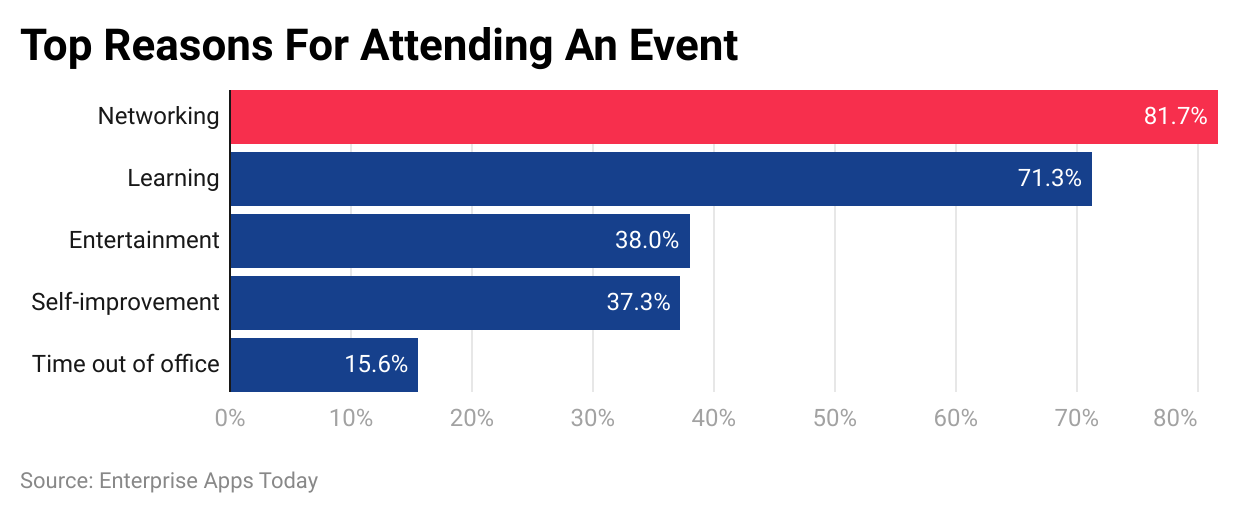 (Reference: 99firms.com)
(Reference: 99firms.com)
Event Marketing Statistics state the primary reason for attending such events for consumers is networking representing 81.7%, followed by learning (71.3%) and entertainment (38%). Around 37.3% attend these events for self-improvement, whereas 15.6% do it as they get themselves time out of office.
By Software
- 92% of marketing professionals say software related to event marketing supports achieving business goals.
- Furthermore, 59.4% of companies are looking for hybrid software tools that can manage in-person and virtual marketing events.
- 49% of marketing professionals use touch screens or interactive kiosks for their event marketing activities.
- 60% of event planners use various mobile applications for in-person events.
- Around 60% of event marketing-related software can track return on investment.
- 79% of consumers who attend events said the host should provide an event app that gives them information about the event’s schedule.
By Metrics Of Tracking
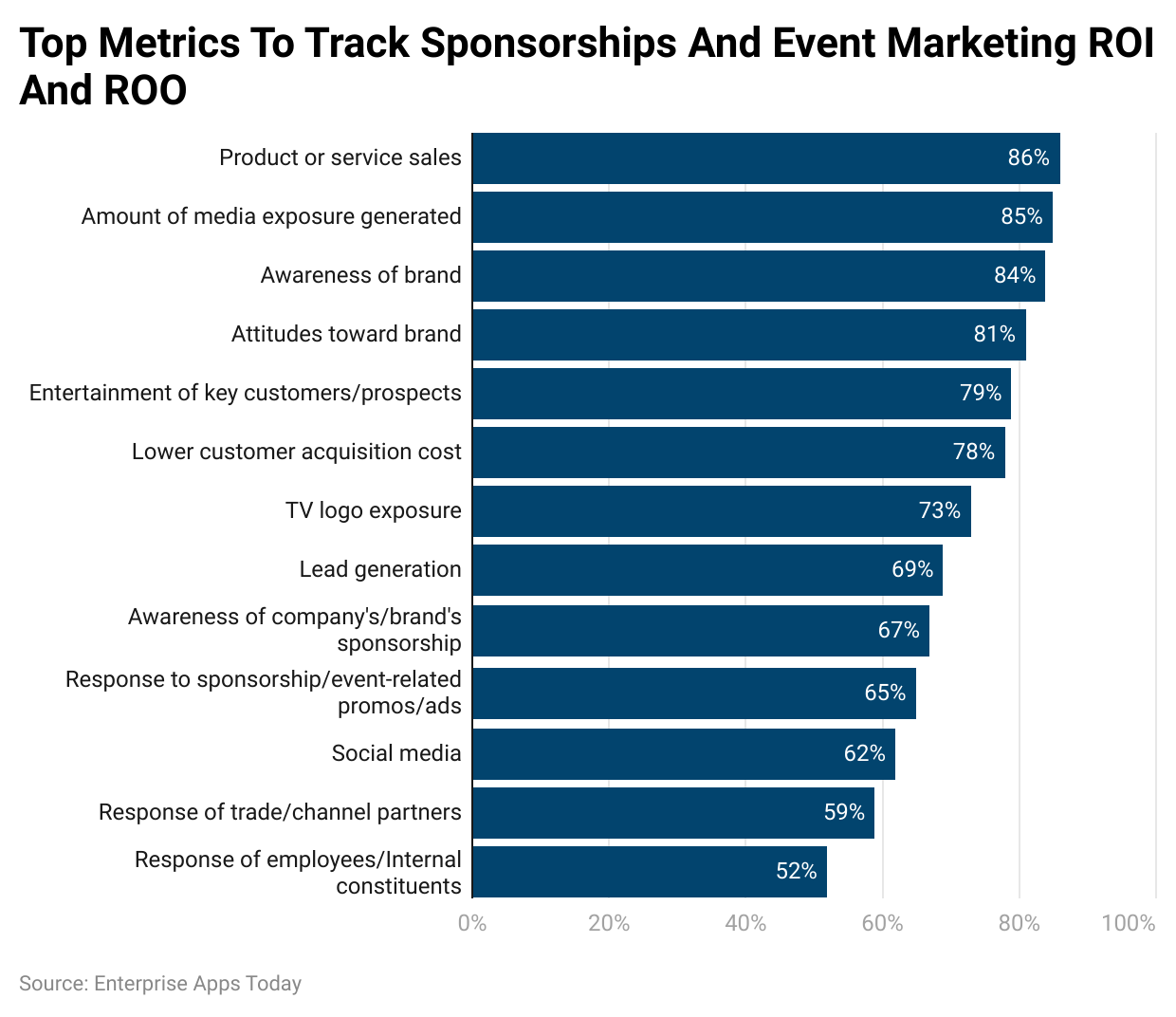 (Reference: 99firms.com)
(Reference: 99firms.com)
Sales of products and services of a company is the top metric to track event marketing ROI, ROO, and sponsorships contributing 86%. The generated amount of media exposure (85th awareness of the brand (84%), attitude towards the brand (81%), and entertainment of key customers or prospects (79%) are the top 5 metrics to measure the same.
By Types Of Events
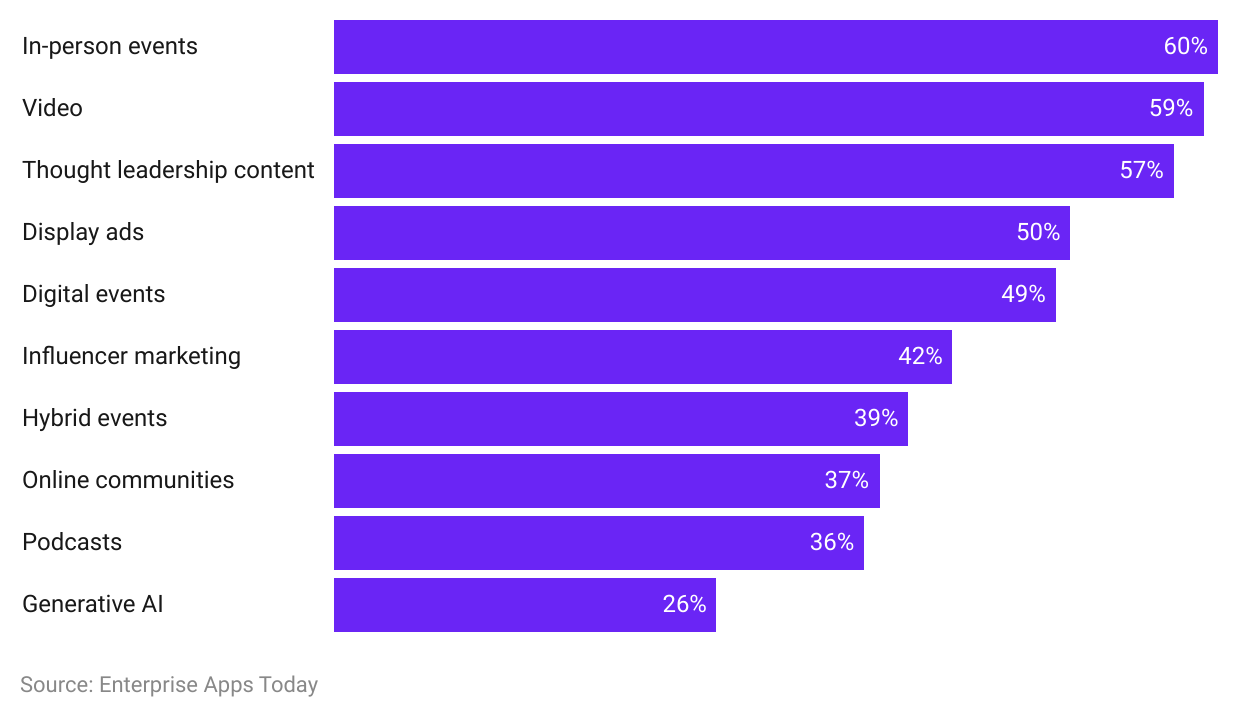 (Reference: vendelux.com)
(Reference: vendelux.com)
Event Marketing Statistics 2023 state that in-person events are the commonly planned events by B2B marketing leaders resulting in 60%. Video and thought leadership content are the top second and third choices representing 59% and 57% respectively. Display Ads, Digital events, influencer marketing, hybrid events, online communities, podcasts, and Generative AI are other preferred types of events.
By Event Tickets By Region
Worldwide
- The worldwide event ticket market is projected to reach $85.07 billion in 2024 growing at a CAGR of 2.54% reaching $94.06 billion by 2028.
- Global comparison of event tickets shows that the music event segment is projected to be the largest market generating a projected volume of $34.23 billion.
- Furthermore, the United States of America is expected to generate the highest revenue resulting in $34.23 billion in the current year.
- The estimated user penetration around the world in the Event tickets market is 9.5% in 2024 reaching 769.0 million by 2028.
Asia
- The Asian event tickets market is projected to be valued at $19.42 billion in 2024 and is expected to grow at a CAGR of 2.31% reaching $21.28 billion by 2028.
- Cinema tickets are expected to be the highest revenue-generating segment resulting in $9.40 billion in 2024.
- The projected user penetration rate in 2024 is 8.2% with 389.3 million expected users by 2028.
Africa
- The African event tickets market will be valued at $1,020.00 million in 2024.
- It is expected to grow at a CAGR of 3.69% by 2028 reaching $1,179.00 million.
- Furthermore, the sports events market is projected to be the largest with an expected contribution of $456.70 million in 2024.
- By 2028, the number of users in the market is projected to reach 37.8 million with a user penetration rate of 2.6%.
Americas
- As of 2024, the American event tickets market is expected to reach $41.43 billion, growing at a CAGR of 2.81% and reaching $46.28 billion by 2028.
- The sports event market is estimated to be the largest segment generating $19.02 billion in 2024.
- Furthermore, the average number of users in the market is projected to reach 183.9 million by 2028, with a penetration rate of 17.1% in 2024.
Australia And Oceania
- Similarly, in 2024, the Australian and Oceania event ticket market is valued at $1.88 billion.
- It is expected that grow at a CAGR of 1.81% reaching $2.02 billion by 2028.
- Furthermore, the user penetration rate is estimated to be 19.9% in 2024, with which the number of users by 2028 will reach 8.5 million.
Europe
- In the European region, the Music event market is projected to be the largest market resulting in $10.04 billion in 2024.
- Furthermore, in 2024, it is valued at $21.33 billion with estimated to grow at a CAGR of 2.23% reaching $23.30 billion by 2028.
- The user penetration rate is estimated to be 17% in 2024, whereas the number of users in the market is projected to reach 149.5 million by 2028.
By Country
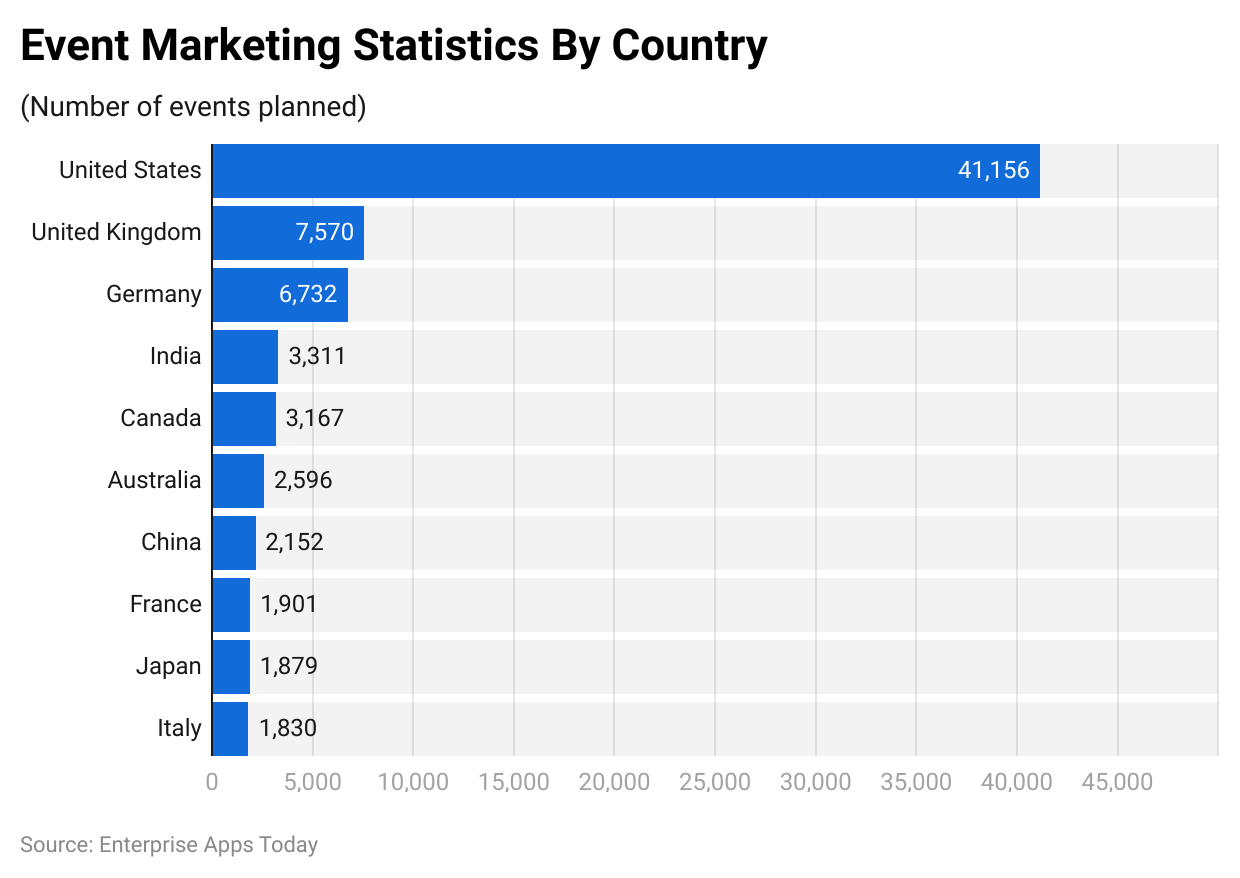 (Reference: statista.com)
(Reference: statista.com)
Considering the business and trade events, the United States of America became the leading host country with 41,156 events hosted in 2023. The United Kingdom and Germany became the second and third-largest countries with the highest number of planned events hosted resulting in 7,570 and 6,732. Other countries on the list were India, Canada, Australia, China, France, Japan, and Italy.
By Planned Changes In Spending
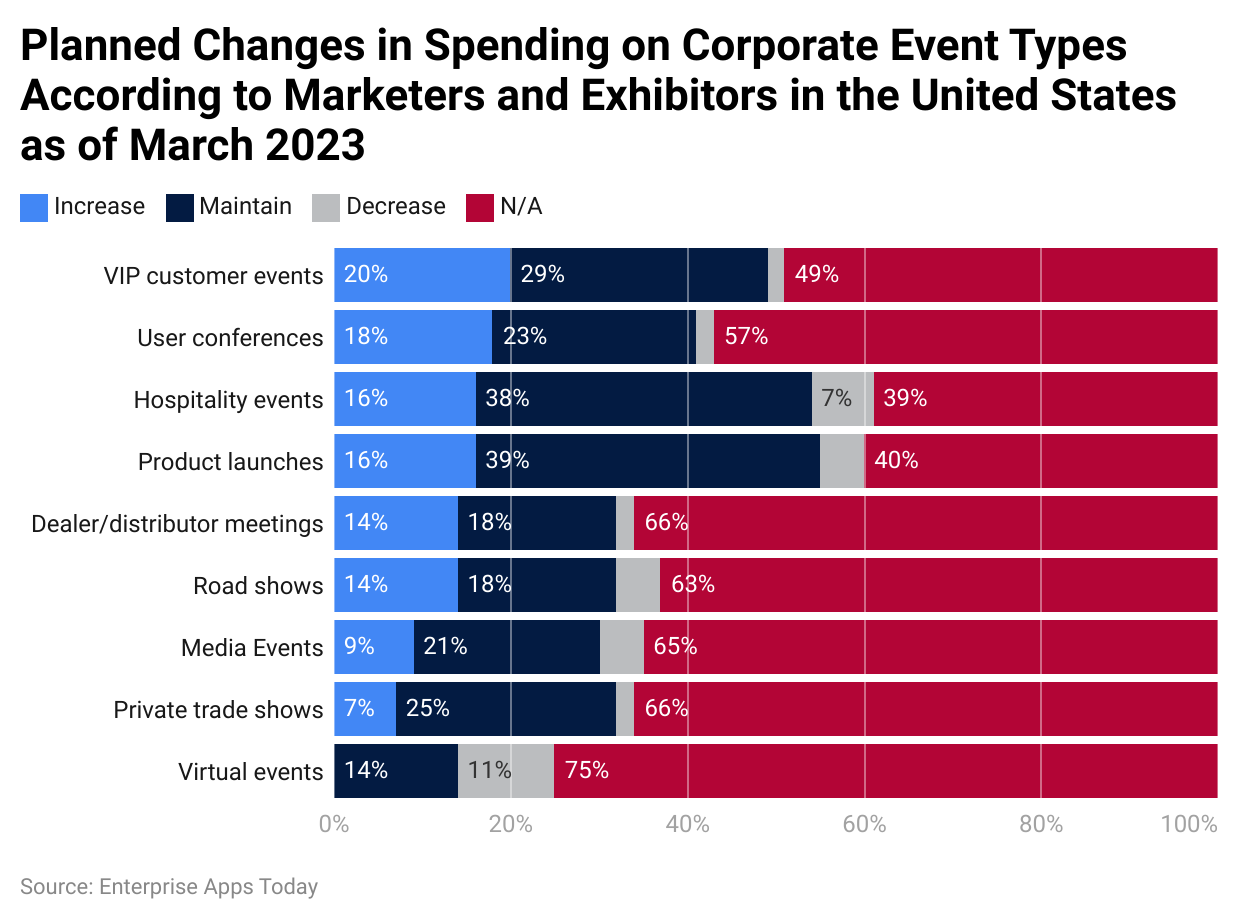 (Reference: statista.com)
(Reference: statista.com)
Event Marketing Statistics 2023 shows that in the last year, the majority of the events were either maintained or simply not applicable in terms of spending on corporate events in the USA. However, VIP customer events, user conferences, hospitality events, product launches, dealer/distributor meetings, media events, and private trade shows have seen an increase in spending.
By Impact Of Social Media
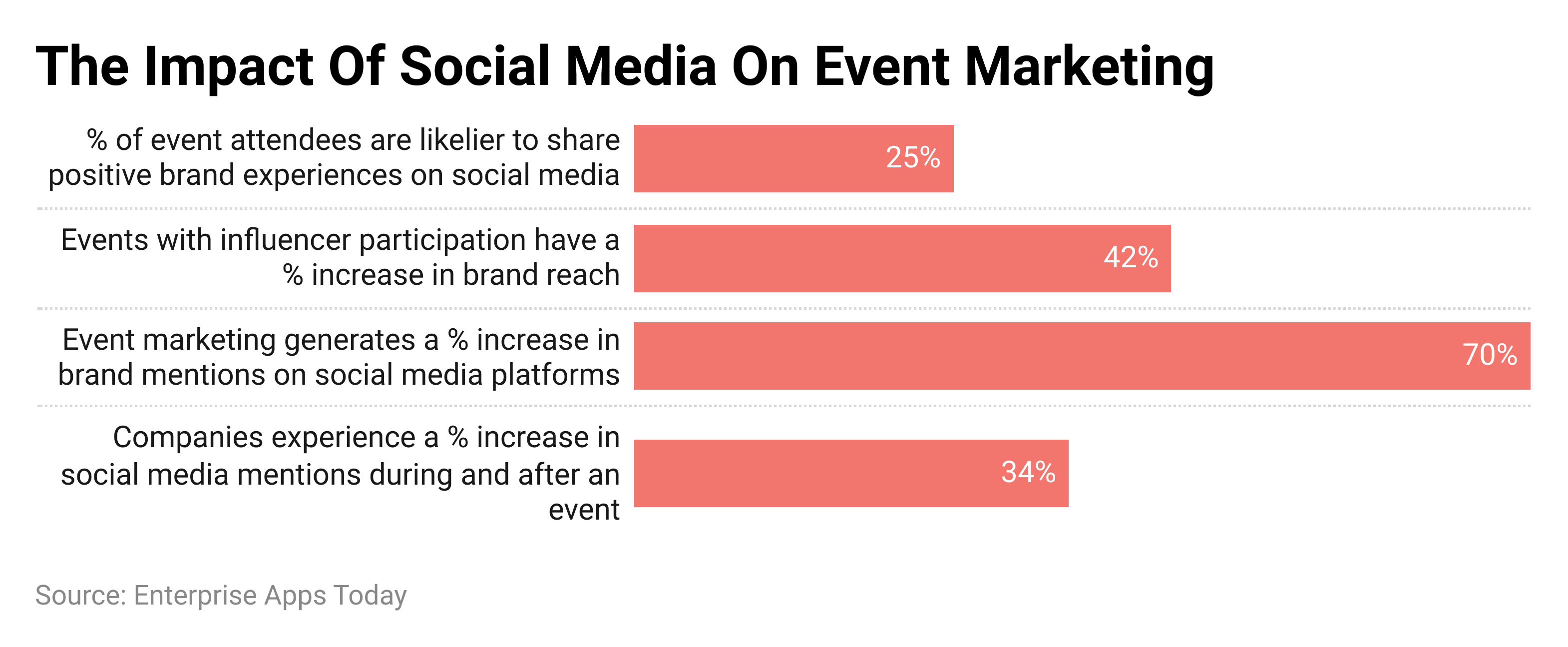 (Reference: marketsplash.com)
(Reference: marketsplash.com)
The majority of the responses observed after the event ended are seen on social media as the increase in the brand mentioned on various platforms resulted in 70%. Furthermore, events that include influencers are 42% time experience increase in brand reach. 34% and 25% of companies experience an increase in social media mentions during or after the events and an increase in sharing brand experiences on social media platforms.
Recent Development
- Increased Use of Immersive Technologies: Virtual and Augmented Reality (VR and AR) are being used to create more engaging and immersive event experiences. For example, during London Fashion Week, Topshop used VR to allow virtual attendance, enhancing participant immersion.
- Sustainability in Event Planning: There's a growing emphasis on environmentally sustainable events, with efforts to reduce carbon footprints and waste. The Tokyo Olympics showcased this trend by recycling waste and using electric vehicles.
- Gamification of Events: Incorporating game-design elements into events is becoming popular for increasing engagement and making experiences memorable. DockerCon’s live video game, Docker Dash, is an example where attendees completed challenges related to Docker's product.
- Year-Round Event Cycles: With the rise of virtual platforms, events can now be held more frequently, extending the conversation and engagement beyond a single event. Platforms like Pathable offer ongoing community features, enabling year-round content and engagement.
- Emphasis on Transformational Experiences: The industry is shifting from focusing on content to prioritizing meaningful and transformative experiences, with a desire for deeper connections and immersive interactions.
- Hybrid Events Remain Key: Hybrid events, combining virtual and in-person elements, are still valuable for their flexibility and wider reach. They are considered crucial for event marketing strategies moving forward.
- Non-traditional Venues Gain Popularity: There’s a trend towards hosting events in unique, non-traditional venues like warehouses, gardens, and museums, which can offer more engaging experiences for attendees.
- AI and Technology Integration: AI experimentation in the events industry is growing, with tools like ChatGPT helping to automate tasks and develop content. Event tech is also becoming more integrated, offering seamless experiences across different platforms.
- Focus on Experience-First Events: Venues are now expected to support immersive and interactive experiences, pushing event organizers to find unique settings that can accommodate such demands.
- Personalization and Data Privacy: As technology offers more personalization, the challenge of maintaining data privacy becomes more significant. Event tech needs to address these concerns while providing customized attendee experiences.
Conclusion
In the dynamic landscape of event marketing, recent statistics underscore the significant shifts and emerging trends shaping the industry. Notably, the increasing preference for hybrid events, with 35% of events in 2022 adopting this format, reflects the ongoing blend of virtual and in-person experiences. The investment in virtual events remains strong, with 93% of event marketers planning to continue or increase their focus in this area, highlighting the enduring impact of digital transformation.
The value of in-person interactions remains undisputed, as evidenced by 61% of marketers identifying these events as their most critical marketing channel, a 20% increase from the previous year. This indicates a rebound in the appreciation for face-to-face engagement amidst a digital-heavy context. Budget allocations for event marketing are also on the rise, with over 54% of organizers managing budgets exceeding USD 500,000, signaling the substantial financial commitment businesses are willing to make towards creating impactful events.
Technology plays a pivotal role in enhancing attendee experience, with 68.7% of event planners turning to tech solutions to elevate engagement. Furthermore, the reliance on data for informed decision-making is evident, with 88% of event professionals believing in the necessity of data for the success of their events.
In conclusion, the event marketing landscape is characterized by a balanced integration of traditional and digital strategies, with a strong emphasis on hybrid formats, technological innovation, and data-driven insights. The financial investments and the strategic focus on personalization and engagement underscore the industry's resilience and adaptability in meeting changing consumer expectations. These trends not only reflect the current state of event marketing but also hint at the future direction, where flexibility, technology, and experience are key.
Sources
FAQ.
In order to promote the brand, product, or service, the strategy used to engage customers or potential customers in person or real-time means event marketing. Events are conducted either offline or online. Companies become sponsors, and participants, or can be hosts or co-hosts. Event marketing aids in reaching more markets, gaining customers, and increasing customer engagement and sales.
Trade shows, meetups, appreciation events, conferences, sponsored shows, etc can be considered event marketing.
Compared to virtual events, in-person events are more beneficial are they provide personal connection with prospects. Moreover, the brand image is well presented in face-to-face interaction. Therefore, in-person events are more beneficial.

Barry is a lover of everything technology. Figuring out how the software works and creating content to shed more light on the value it offers users is his favorite pastime. When not evaluating apps or programs, he's busy trying out new healthy recipes, doing yoga, meditating, or taking nature walks with his little one.